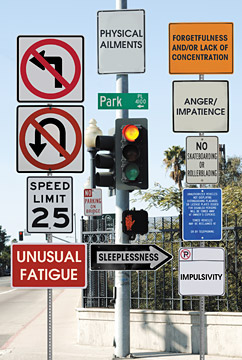Stress is a dirty word in today's society. Everyone seems to know what it is and has too much of it; they just don't know what to do with it. It is no wonder to me that we have the chronic health issues we do.
Heart disease, diabetes, digestive issues and obesity are at epidemic levels. It is likely that these and many more conditions are related to stress. It is time we start investigating the full spectrum of what stress is, where it comes from and how we can reduce it. Talk to your doctor about your stress threshold and how stress is playing a role in your life (and health).
Stress Signals
Are you stressed out? Believe it or not, many people don't recognize that they're stressed or actually think they're handling it. If you're experiencing any of the following, you're a prime candidate for some stress reduction:
Unusual fatigue: Stress weighs on you physically, emotionally and mentally. It wears you down and drains you. Can't get out of bed in the morning? Stress may be what's keeping you there.
 Sleeplessness: You may feel like sleeping for a day or two, but stress tends to keep you up at night, pondering how to pay that bill, meet that work deadline or heal that broken friendship.
Sleeplessness: You may feel like sleeping for a day or two, but stress tends to keep you up at night, pondering how to pay that bill, meet that work deadline or heal that broken friendship.
Impulsivity: If you find your eating habits changing suddenly, you may be turning to comfort foods to deal with stress. The same is true with impulse buying, particularly when it involves items you don't really need.
Anger/impatience: Stress can make you short-tempered and easily roused to anger, even if your demeanor is normally calm, quiet and reserved.
Lack of concentration/forgetfulness: Stress usually occupies our mental time, so much so that we can have trouble remembering things or make more mistakes. Never forget your keys in the morning? When you're stressed, you just might.
Physical ailments: Back pain, neck pain and pain in general that doesn't have a clear cause (e.g., an injury) is often related to stress. The same is true for colds and flu; stress can lower your immune system, increasing your risk of developing illness.
Reduce Your Stress Burden
 You might not be able to change your stress threshold that much, but you can get better at dealing with stress when it builds up. Here are a few suggestions:
You might not be able to change your stress threshold that much, but you can get better at dealing with stress when it builds up. Here are a few suggestions:
Work it off: No, we don't mean spending another five hours a day at the very location that may be a major source of stress; we do mean finding the time to exercise. Whether it's an a quick trip to the gym, a peaceful run or a brisk walk with family or friends, exercise puts the focus somewhere else for a while. Biochemically, exercise has a big anti-stress benefit: It helps reduces levels of the stress hormone (cortisol) and increases your "feel-good" hormones, endorphins.
Get away from it: This can be challenging, especially if your stress has reached near-obsession levels, but doing what you can to distract yourself can go a long way toward reducing stress. Schedule a vacation, visit old friends, take a long walk; whatever it takes to remove yourself from your stress environment.
Smile about it: It's much harder for stress to exist in a fun, laughter-filled environment, so put yourself in a position to smile when you're under stress. Watch your favorite sit-com, get tickets to a comedy show, organize a fun night out with the family or friends. After all, laughter truly is the best natural medicine.
Talk about it: When you're stressed, your mind can be a continual stream of negative, overwhelming, stressed-out thoughts. Don't keep it all to yourself; talk to your significant other, closest friend or even a trusted co-worker about what's bothering you. Sometimes the best way to reduce your stress is to vent about it and get a neutral perspective, rather than staying in a bottled-up, stressed-out state.
Andrew Glanville, DC, practices at MacDonald Chiropractic in Spokane, Wash., focusing on whole family health and wellness. A significant part of his practice emphasis is stress relief through chiropractic and nutritional counseling.

